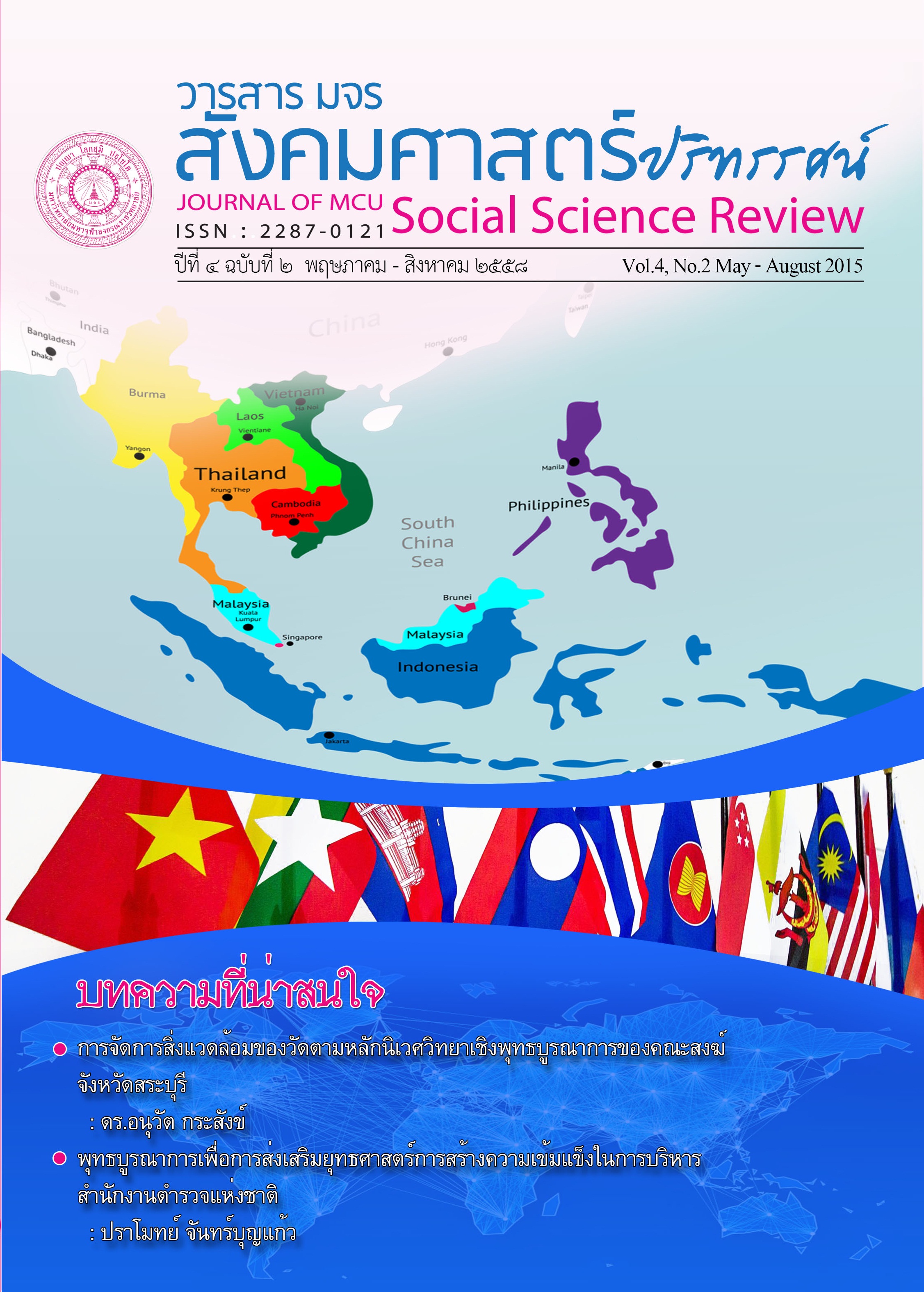การพัฒนาภาวะผู้นําตามหลักพุทธธรรมของบุคลากรโรงเรียนพระปริยัติธรรม แผนกสามัญศึกษา กลุ่ม ๓
คำสำคัญ:
การพัฒนาภาวะผู้นำ, หลักพุทธธรรม, โรงเรียนพระปริยัติธรรม แผนกสามัญศึกษาบทคัดย่อ
วัตถุประสงค์ของการวิจัย ๑) เพื่อศึกษาแนวคิดภาวะผู้นําตามหลักพุทธธรรมและทฤษฎี ทางตะวันตกภาวะผู้นําของบุคลากรโรงเรียนพระปริยัติธรรม แผนกสามัญศึกษา กลุ่ม ๓ ๒) เพื่อ ศึกษาสภาพปัญหาทั่วไปและคุณลักษณะภาวะผู้นําของบุคลากรโรงเรียนพระปริยัติธรรม แผนก สามัญศึกษา กลุ่ม ๓ และ ๓) เพื่อนําเสนอรูปแบบการพัฒนาภาวะผู้นําของบุคลากรโรงเรียน พระปริยัติธรรม แผนกสามัญศึกษา กลุ่ม ๓ ระเบียบวิธีวิจัยแบบผสานวิธี (Mixed Methods Research) ระหว่างการวิจัยเชิงคุณภาพ (Qualitative Research) และการวิจัยเชิงปริมาณ (Quantitative Research) การวิจัยเชิงคุณภาพ เก็บข้อมูลจากผู้ให้ข้อมูลหลัก จํานวน ๒๘ รูป/คน เลือกแบบเจาะจงจากผู้ทรงคุณวุฒิ เครื่องมือสําหรับเก็บข้อมูลได้แก่ แบบสัมภาษณ์เชิงลึกที่มี โครงสร้าง เก็บข้อมูลด้วยการสัมภาษณ์ตัวต่อตัว วิเคราะห์ข้อมูลด้วยการพรรณนาความ และจาก การสนทนากลุ่มเฉพาะ จากผู้มีส่วนร่วม ในการสนทนา จํานวน ๑๒ รูป/คน เลือกแบบเจาะจง วิเคราะห์ข้อมูลด้วยการพรรณนาความ การวิจัยเชิงปริมาณ เก็บข้อมูลจากกลุ่มตัวอย่าง ๑๕๖ รูป/ คน เป็นผู้บริหาร ๒๑ รูป/คน ผู้ปฏิบัติงาน ๑๓๕ รูป/คน วิเคราะห์ข้อมูลด้วยค่าความถี่ ค่าร้อยละ ค่าเฉลี่ย ส่วนเบี่ยงเบนมาตรฐาน
ผลวิจัยพบว่า
๒. แนวคิดภาวะผู้นําตามหลักพุทธธรรมและทฤษฎีทางตะวันตกของภาวะผู้นําของ ผู้บริหารโรงเรียนพระปริยัติธรรม แผนกสามัญศึกษา กลุ่ม ๓ พบว่า ๑) คุณลักษณะภาวะผู้นําตาม หลักพุทธธรรมต้าน หลักปาปณิกธรรม ๓ รองลงมาคือสังฆโสภณสูตร อันดับที่สามคือคุณธรรม
อนาถบิณฑิกะเศรษฐี และด้านภาวะผู้นําการเปลี่ยนแปลง ๒) กระบวนการและวิธีการพัฒนาภาวะ ผู้นําที่มีผลต่อการทํางานอย่างมีประสิทธิภาพ ประกอบด้วยการเข้ารับการอบรมสัมมนาภาวะผู้นํา การศึกษาดูงาน โรงเรียนพระปริยัติธรรมที่มีการบริหารจัดการที่ดีและมีผู้นําที่ได้รับการยกย่อง เชิดชูเกียรติหรือเป็นที่รู้จักกันดีและการกระจายอํานาจภาวะผู้นําในลักษณะการประสานความ ร่วมมือ
๒. สภาพปัญหาทั่วไปและคุณลักษณะภาวะผู้นําของบุคลากรโรงเรียนพระปริยัติธรรม แผนกสามัญศึกษา กลุ่ม ๓ ๑) ด้านบุคลากร พบว่าบุคลากรขาดความมั่นคงในวิชาชีพครู สวัสดิการ ไม่เท่าเทียมบุคลากรภาครัฐ อัตราการเข้าออกบ่อยทําให้ขาดความต่อเนื่องในการปฏิบัติงาน ๒) ด้านงบประมาณ งบประมาณหลักของโรงเรียนมาจากค่างบอุดหนุนเฉลี่ยรายหัวต่อนักเรียน เมื่อ นักเรียนมีจํานวนน้อยจึงทําให้มีงบประมาณหมุนเวียนน้อย ซึ่งเป็นปัญหาอุปสรรคในการบริหาร จัดการ และ ๓) ด้านการบริหารงานของผู้บริหาร ผู้บริหารหลักคือเจ้าอาวาสแม้จะมีคณะกรรมการ บริหาร แต่มีภารกิจสงฆ์มาก จึงทําให้การบริหารขาดความคล่องตัว และคุณลักษณะภาวะผู้นําของ ผู้บริหารโรงเรียนพระปริยัติธรรมพบว่า มีความเสียสละ ความเอื้อเฟื้อ เมตตา กรุณา มีวิสัยทัศน์ มีมนุษยสัมพันธ์ มีความรับผิดชอบ ความทุ่มเทในการทํางาน และการบริหารงานแบบมีส่วนร่วม
๓. ส่วนรูปแบบการพัฒนาคุณลักษณะภาวะผู้นําของผู้บริหารโรงเรียนพบว่าอันดับแรก หลักธรรมด้านหลักปาปณิกธรรม ๓ ในด้านจักขุมา (การมีวิสัยทัศน์ที่ดี) ด้านวิธโร (ด้านความ ชํานาญในงาน ความเป็นมืออาชีพ) และด้านนิสสุยสัมปันโน (การสร้างความสัมพันธ์ ความเข้าใจอัน ดี ตลอดจนการสร้างสรรค์ทางสังคม โดยอาศัยทักษะด้านมนุษยสัมพันธ์) รองลงมาคือสังฆโสภณ สูตร ด้านวิสารโท (เป็นผู้แกล้วกล้า เป็นผู้องอาจในการเผชิญปัญหาต่าง ๆ ที่เกิดขึ้น) ด้านวินโต (เป็นผู้มีระเบียบวินัยดี มีความเรียบร้อยในกิจการงานที่ได้รับมอบหมาย) ด้านวิยัตโต (การเป็นผู้มี ปัญญา มีความรอบรู้และมีความฉลาดหลักแหลมในการปฏิบัติงาน) ต้านธัมมานุธัมมปฏิปันโน (ผู้ ปฏิบัติธรรม รักษาความถูกต้องในสิ่งที่ถูกที่ควร) และด้านพหูสุโต (เป็นผู้มีความรู้ศึกษาความทรงจํา ผู้ที่ได้รับการศึกษามาก) อันดับที่สามคือคุณธรรมอนาถบิณฑิกะเศรษฐี การมีความซื่อสัตย์ สุจริต และขยันสติปัญญาเป็นเลิศ ความเอื้อเฟื้อเผื่อแผ่ และด้านความเสียสละ และภาวะผู้นําตามทฤษฎี ตะวันตก ได้แก่ ด้านภาวะผู้นําการเปลี่ยนแปลง การให้อิสรภาพในการทํางาน การกระตุ้นให้มีเจต คติที่ดีในการทํางานอย่างมีประสิทธิภาพและประสิทธิผล การเป็นแบบอย่างสันติภาพและสิทธิ มนุษยชนและต้องการให้ผู้นํามีความยุติธรรมเสมอภาคในการปฏิบัติงาน ต้องมีความกล้าหาญใน การเปลี่ยนแปลง โดยนํามาซึ่งจริยธรรม การเปลี่ยนแปลงอย่างมีนวัตกรรมเพื่อความเหนือกว่า ภายใต้การยืดหยุ่น ปรับเปลี่ยนตามความเหมาะสมกับสถานการณ์ของโรงเรียน อันนํามาซึ่งความอยู่ รอด รวมทั้งนอกจากนี้ผู้นําต้องรู้จักใช้หลักพุทธธรรมในการสร้างศรัทธาให้เกิดขึ้นแก่ตนเองด้วย
เอกสารอ้างอิง
(๑) หนังสือ:
เนตร์พัณณา ยาวิราช. การจัดการสมัยใหม่, กรุงเทพมหานคร: บริษัททริปเปิ้ล กรีป จํากัด,๒๕๕๖.
(๒) วารสาร
วันชัย สุขตาม. “วิกฤตการณ์ของผู้นําไทย: ปัญหาและทางออก”, มจร สังคมสาสตร์ปริทรรศน์,ปีที่ 9 ฉบับที่ ๑ มกราคม - มีนาคม พ.ศ. ๒๕๕๕) ฉบับปฐมฤกษ์ : ๑๒๗.
(๓) วิทยานิพนธ์/รายงานการวิจัย
กฤษดา ผ่องพิทยา, “การวิเคราะห์องค์ประกอบและความสัมพันธ์ของคุณลักษณะของภาวะผู้นําที่พึงประสงค์พฤติกรรมภาวะผู้นําที่พึงประสงค์และปัจจัยชีวสังคมของผู้บริหาร สถานศึกษาขั้นพื้นฐาน” วิทยานิพนธ์ครุศาสตรดุษฎีบัณฑิต. บัณฑิตวิทยาลัย:มหาวิทยาลัยนเรศวร, ๒๕๔๗
ชฏิล นิ่มนวล, “รูปแบบความสัมพันธ์เชิงโครงสร้างระหว่างคุณธรรมของผู้บริหารสถานศึกษากับความภักดีต่อองค์การของผู้รับบริการ” วิทยานิพนธ์ปรัชญาดุษฎีบัณฑิต. บัณฑิตวิทยาลัย: มหาวิทยาลัยศิลปากร, ๒๕๕๒.
นริสานนท์ เดชสุระ “รูปแบบการบริหารโรงเรียนสาธิตปฐมวัยของมหาวิทยาลัยราชภัฏ”วิทยานิพนธ์ปรัชญาดุษฎีบัณฑิต. บัณฑิตวิทยาลัย: มหาวิทยาลัยศิลปากร, ๒๕๕๒.
ประทีป บนชัย. “รูปแบบการพัฒนาภาวะผู้นําตามแนวภาวะผู้นพิสัยสมบูรณ์ของผู้บริหารสถานศึกษาในระดับการศึกษาขั้นพื้นฐาน” วิทยานิพนธ์ปรัชญาดุษฎีบัณฑิต. บัณฑิตวิทยาลัย: มหาวิทยาลัยนเรศวร, ๒๕๔๖.
ปิลัญ ปฏิพิมพาคม. “รูปแบบภาวะผู้นําและประสิทธิผลของผู้บริหารสถานศึกษาเอกชนระดับการศึกษาขั้นพื้นฐาน” วิทยานิพนธ์ปรัชญาดุษฎีบัณฑิต. บัณฑิตวิทยาลัยมหาวิทยาลัยศิลปากร, ๒๕๕๒.
พระครูใบฎีกาบุญชู ชุติปญโญ (บุญวงศ์), “รูปแบบการบริหารโรงเรียนพระปริยัติธรรม แผนกสามัญศึกษา วิทยานิพนธ์ปรัชญาดุษฎีบัณฑิต. บัณฑิตวิทยาลัย: มหาวิทยาลัยวงษ์ชวลิตกุล, ๒๕๕๔.
พระจิณณวัตร กิ่งแก้ว. วิทยานิพนธ์ครุศาสตรดุษฎีบัณฑิต สาขาวิชาบริหารการศึกษา บัณฑิตวิทยาลัย: มหาวิทยาลัยราชภัฏวไลยอลงกรณ์, ๒๕๕๕. พัชราณี ฟักทองพรรณ. “แนวโน้มคุณลักษณะผู้นําที่พึงประสงค์ของผู้บริหารโรงเรียนสตรีเอกชน”วิทยานิพนธ์ปรัชญาดุษฎีบัณฑิต.บัณฑิตวิทยาลัย: จุฬาลงกรณ์มหาวิทยาลัย, ๒๕๕๔.
สมคิด สกุลสถปัตย์. “รูปแบบภาวะผู้นําการเปลี่ยนแปลงที่มีประสิทธิผลในการปฏิรูปการศึกษาแบบยั่งยืน” วิทยานิพนธ์ปรัชญาดุษฎีบัณฑิต สาขาวิชาการบริหารการศึกษาบัณฑิตวิทยาลัย: มหาวิทยาลัยศิลปากร, ๒๕๕๒.
สมถวิล ซูทรัพย์, “การพัฒนาเครื่องมือและตัวชี้วัดคุณลักษณะผู้บริหารสถานศึกษาที่มีประสิทธิภาพ” วิทยานิพนธ์ปรัชญาดุษฎีบัณฑิต. บัณฑิตวิทยาลัย: มหาวิทยาลัยศิลปากร, ๒๕๕๐.
สุภาว์ อาวสกุลสุทธิ “รูปแบบการพัฒนาคุณลักษณะภาวะผู้นําของหัวหน้างานการพยาบาลโรงพยาบาลชุมชน” วิทยานิพนธ์ปรัชญาดุษฎีบัณฑิต บัณฑิตวิทยาลัย: มหาวิทยาลัย รามคําแหง, ๒๕๕๒.
สุรัชนี เคนสุโพธิ์, “รูปแบบการพัฒนาคุณลักษณะภาวะผู้นําของนักบริหารงานเทศบาล”วิทยานิพนธ์ปรัชญาดุษฎีบัณฑิต. บัณฑิตวิทยาลัย: คณะศึกษาศาสตร์ มหาวิทยาลัย
รามคําแหง, ๒๕๕๖
อนุชิต วรรณสุทธิ์, “การศึกษาคุณลักษณะผู้บริหารสถานศึกษามืออาชีพในอนาคต” รายงานวิจัยบัณฑิตวิทยาลัย: สถาบันราชภัฏบุรีรัมย์, ๒๕๔๘
อุทัย โล้วมั่นคง “การนําเสนอแนวทางการพัฒนาคุณลักษณะภาวะผู้นําทางจริยธรรมตามแนวพุทธศาสนาของผู้บริหารสถานศึกษา สังกัดสํานักงานคณะกรมการการศึกษาขั้น พื้นฐาน” วิทยานิพนธ์ครุศาสตรดุษฎีบัณฑิต. บัณฑิตวิทยาลัย:จุฬาลงกรณ์ มหาวิทยาลัย, ๒๕๕๓
(๔) สื่ออิเล็กทรอนิกส์/เว็บไซต์:
ปัญหาของระบบศึกษาไทย, [ออนไลน์]. แหล่งที่มา: http://www.manager.co.th/daily/viewnews.aspx? NewsID=๕๕๖00000๘๕๓๐๙ [๘ สิงหาคม ๒๕๕๖].
วรากรณ์ สามโกเศศ. “เสนอให้โรงเรียนปริยัติธรรมเข้าระบบ ห่วงคุณภาพพระเณรว่าครึ่งแสน”,สํานักข่าวไทย [ออนไลน์]. แหล่งที่มา:http://webboard.niyay.com/ detail/ ๒๕๕๔๓.html [๘ สิงหาคม ๒๕๕๖]
๒. ภาษาอังกฤษ
(1) Book:
Hoy, Wayne K., & Miskel, Cecil G. Educational Administration: Theory,Researchand Practice. 6th ed. New York: Mc Graw-Hill, 1991.
Mott, Paul E. The Characteristics of Effective Organizations. New York:Harper andRow, 1972
ดาวน์โหลด
เผยแพร่แล้ว
รูปแบบการอ้างอิง
ฉบับ
ประเภทบทความ
สัญญาอนุญาต
ลิขสิทธิ์ (c) 2018 วารสาร มจร สังคมศาสตร์ปริทรรศน์

อนุญาตภายใต้เงื่อนไข Creative Commons Attribution-NonCommercial-NoDerivatives 4.0 International License.
เพื่อให้เป็นไปตามกฎหมายลิขสิทธิ์ ผู้นิพนธ์ทุกท่านต้องลงลายมือชื่อในแบบฟอร์มใบมอบลิขสิทธิ์บทความให้แก่วารสารฯ พร้อมกับบทความต้นฉบับที่ได้แก้ไขครั้งสุดท้าย นอกจากนี้ ผู้นิพนธ์ทุกท่านต้องยืนยันว่าบทความต้นฉบับที่ส่งมาตีพิมพ์นั้น ได้ส่งมาตีพิมพ์เฉพาะในวารสาร มจร สังคมศาสตร์ปริทรรศน์ เพียงแห่งเดียวเท่านั้น หากมีการใช้ภาพหรือตารางหรือเนื้อหาอื่นๆ ของผู้นิพนธ์อื่นที่ปรากฏในสิ่งตีพิมพ์อื่นมาแล้ว ผู้นิพนธ์ต้องขออนุญาตเจ้าของลิขสิทธิ์ก่อน พร้อมทั้งแสดงหนังสือที่ได้รับการยินยอมต่อบรรณาธิการ ก่อนที่บทความจะได้รับการตีพิมพ์ หากไม่เป็นไปตามข้อกำหนดเบื้องต้น ทางวารสารจะถอดบทความของท่านออกโดยไม่มีข้อยกเว้นใดๆ ทั้งสิ้น





